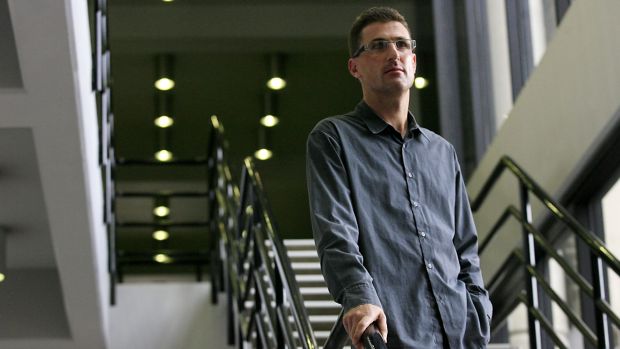
Conflict of interest: Dr Kypros Kypri, senior research fellow with the University of Newcastle School of Medicine and Public Health has published the results of a survey showing that most people want ingredient information printed on the labels of alcoholic beverages. Photo: Brock Perks
Australia’s attempts to stop the hundreds of deaths and injuries caused by alcohol every day are being co-opted by the alcohol industry, according to furious public health researchers and advocates.
Fairfax Media has learnt that a recent meeting of the Intergovernmental Committee on Drugs (IGCD), which provides advice and implements drug policy, consisted of about 10 per cent of participants who had direct ties to the alcohol industry, as well as representatives from other groups that receive alcohol sponsorship.
At the session, groups were allowed to vote for which strategies were best for reducing alcohol-related violence and harms, attendees said.
Public health groups say there is a pattern of the most effective strategies for reducing alcohol harms which are being rejected by governments after industry lobbying, and they say the industry has no place in developing strategies to limit Australia’s consumption of alcohol.
However, the health department maintains that the outcomes of the meeting will not form part of Australia’s long-awaited alcohol policy, which will be developed independent of industry influence.
University of Newcastle professor Kypros Kypri said it was “quite explicit” that the meeting, held in the ACT last month, would feed into the development of official policy.
“I don’t understand how the industry can be considered a stakeholder in health policy,” he said. “They want to align themselves with the stuff that has got a feel-good flavour and do whatever they can to reduce regulation, and that’s understandable, it’s what I would do if I were them.”
Professor Kypri published an article in the journal PLoS Medicine on Wednesday outlining how internationally alcohol policy has been influenced by the alcohol industry to prevent effective tactics such as minimum pricing being implemented.
Foundation for Alcohol Research and Education chief executive Michael Thorn said having the alcohol industry involved focussed the debate on ineffective measures for tacking alcohol harm.
“Of course the industry has to be involved in the implementation of any public policy or public policy changes… but you can’t have a productive discussion with the bureaucrats who are the conduits to government about how they should be tackling trading hours issues or availability or awareness campaigns, because the discussion gets skewed,” he said.”You couldn’t have the tobacco industry in the room, so how come the alcohol industry is so different?”
However, a spokeswoman for the Federal Department of Health strongly denied that the alcohol industry would ever be involved in the development of Australia’s alcohol policy.
“While the IGCD does not involve industry in policy formulation, it considers there is value in liaising with any organisation that has a role to play in reducing alcohol related harms,” she said. “The primary purpose of this meeting was to discuss potential ways to reduce alcohol-related violence and harms, including in and around licensed premises [so]… it was considered appropriate to include industry representatives.”
And representatives from the Brewers Association, the Distilled Spirits Industry Council of Australia and Carlton United Breweries defended their right to be involved in alcohol policy.
Spirits council manager of information and research Stephen Riden said the public health industry was constantly trying to shut down all other voices.
“They think industry has no moral legitimacy and should not be allowed to speak to government, irrespective of any knowledge or expertise we can bring,” he said.
“We – the industry – are the only side in the debate who speak up for the more than 10 million adult consumers of alcohol, and talk about what they want.”
While Denita Wawn, the chief executive of the Brewers Association said the industry had much insight to offer, and any conflicts of interest could be managed in a transparent manner.
“The Brewers Association believes the recent IGCD forum was an opportunity to bring all stakeholders together, to learn from each other and work collaboratively on the agreed objective – the ongoing reduction of alcohol related harm in Australia,” she said. “It was disappointing that a number of attendees wanted to spend more time on arguing the point on industry attendance as opposed to focusing on the issue at hand.”
